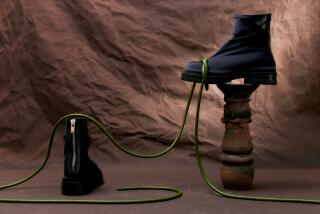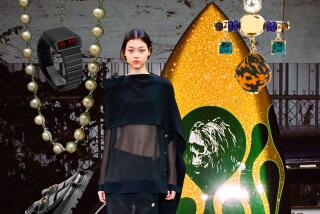Chinese are up to speed with life in the fast lane
- Share via
Reporting from Beijing — Barely a decade ago, Beijing bicyclists pedaled down alleys here lined with courtyard houses that had no indoor toilets. Now the alleys have been replaced by a wide avenue lined with Lamborghini, Ferrari, Bugatti and Rolls-Royce dealerships.
In 2011, Chinese bought more Lamborghinis and Rolls-Royces than anybody else in the world. In time for Chinese New Year this month, Rolls is unveiling a “Year of the Dragon” model with hand-embroidered versions of mythical animals on leather headrests. Prices start at $1.6 million.
China is on the verge of becoming the leading market for just about everything over-the-top expensive.
Companies obsessed with China a few years back for its flagrant counterfeiting now see it as their most promising customer, especially at a time when so many other nations are scrimping.
Gucci’s sales in China in the first half of 2011 were up 39%; Bottega Veneta’s more than 80%. Prada plans to open 50 shops over the next three years.
Chinese fashionistas are displacing those immaculate Japanese women in their Burberry scarves as the world’s leading consumers of luxury goods. The consulting firm McKinsey & Co. projected that China will bump Japan out of first place by 2015 as the leading market for pricey goods. Even with the softening of China’s real estate market, the source of much new money, some analysts believe the Chinese already top the luxury market.
In fact, the sales figures understate Chinese spending because the rich here do much of their shopping abroad to avoid high taxes on luxury items and electronics.
So far, the Chinese haven’t approached the excesses of the so-called New Russians, who after the Soviet collapse were quickly flaunting diamond-encrusted baubles and mega-yachts. After all, China is still at least nominally a communist country and the culture is rich with proverbs about the terrible things that can befall you for showing off. (“A tall pine attracts more wind” and “Man should avoid fame like a pig avoids fattening,” to name two.)
Yet for some, conspicuous consumption, particularly in the social media era, does not seem to be a problem. Young women post photographs of themselves on microblogs with their Hermes handbags. The son of an auto tycoon uploaded on the Chinese equivalent of YouTube a video made from behind the wheel of his $4.5-million Bugatti Veyron sports car as it wove through traffic in the southern city of Chongqing.
“People are more extroverted. They have no problem showing off their wealth,” said Klaus Paur, an auto industry analyst and managing director in the Shanghai office of Synovate Motoresearch. He recalls that when he came to China in 2003, the wealthy drove large Mercedeses and Audis, invariably black.
Chinese officialdom has something of a love-hate relationship with luxury goods, officials relishing their own creature comforts while deploring anyone else doing it too flagrantly. China still has 150 million people living on less than $1 a day. And it maintains some of the highest taxes in the world on luxury goods, adding as much as 60% to the cost — which is why rich Chinese have become such prodigious shoppers abroad.
The word shechi, or “luxury,” is banned in advertising and company names, said Ouyang Kun, who runs a trade group in Beijing called the World Luxury Assn. “The government feels luxury items are only affordable for a few people. They don’t want to create unharmonious feelings among the people,” he explained.
The Chinese equivalent of Rodeo Drive is a four-block strip in the heart of old Beijing along Jinbao Street, whose name appropriately means “gold treasure.” The street was built in 2002 out of two traditional hutongs, or alleys, one named Jinyu, or “goldfish,” and the other Yaba, or “mute man,” part of a larger redevelopment project that displaced more than 4,000 families.
Along the same row as the luxury car dealerships is a branch of Hong Kong’s Jockey Club and a seven-story mall where a Bottega Veneta handbag made of African crocodile skin can set you back $51,000 and a jewel-encrusted cellphone $132,000.
Expensive simply for the sake of expensive is all the rage. At a trade show on the resort island of Hainan in November, promoters unveiled a gold-plated toilet costing more than $200,000.
The recently opened Black Swan Luxury Bakery (that’s the English name; it’s the Black Swan Art Bakery in Chinese because of the ban on shechi) made headlines with a multitiered, cream-swathed wedding cake in the front window with a $314,000 price tag.
The phenomenon isn’t limited to Beijing. Drive through most dusty provincial capitals now and you’ll see high-end shops in the center of town, often alongside the People’s Square — a popular name in deference to communist tradition. In Chongqing, a city once famous for its revolutionary zeal, a five-story Louis Vuitton shop opened in September, overshadowing the iconic Liberation Monument.
Chinese buyers of luxury goods are generally young adults, in keeping with the relative youthfulness of the country’s millionaires (about 15 years younger than those in the West), according to the Shanghai-based Hurun Research Institute, which maintains a so-called rich list.
“Our customers are super-rich, second-generation young people who have inherited money or whose parents buy them cars,” said Wilson Ho, whose company, Hong Kong-based Sparkle Rolls, runs the Lamborghini dealership in Beijing. “Chinese parents love their kids. They’ll buy them whatever they like.”
Some of the new rich made their money selling cheap, mass-produced merchandise abroad. For themselves they want only the best.
“It’s not just about showing off. People have come to appreciate quality,” said Liu Lijuan, a young mother who was taking out a Salvatore Ferragamo wallet from a Louis Vuitton bag to pay for a birthday cake for her 2-year-old daughter at the Black Swan.
The best increasingly means the real thing. Although knockoffs are still widely available, a McKinsey poll released in March found that the percentage of consumers willing to buy fake jewelry had dropped from 31% in 2008 to 12%.
Unlike Western consumers of high-end goods, who usually buy things for themselves, those in China are shopping for a gift as often as for themselves, according to market research.
“I like luxury brands. When you buy it for somebody else, it shows how much care you put into it,” said 26-year-old Liang Chunfeng, who carries a large, red Chanel purse that she coyly described as “a gift from somebody.”
Chinese sometimes use expensive gifts — whether Montblanc pens or luxury watches or $100-a-pack cigarettes — as a way of greasing the wheels while doing business. Politicians are frequent recipients.
In September, an activist published a report on the wristwatches worn by government officials based on publicly released photographs that he blew up and analyzed. Most flashy was the railroad minister, Sheng Guangzu, who appeared to own at least four luxury watches, including a Rolex, worth a total of $62,000.
“I can’t say there is a direct link between expensive watches and corruption, but you have to ask where they got these items that so obviously exceed in value their ordinary income,” said the activist, Daniel Wu.
A 20-year-old woman became Public Enemy No. 1 in June when she posted photographs of herself with luxury handbags, jewelry, a Maserati and a Lamborghini. On a blog, the woman, who writes under the name Guo Meimei, also claimed to be a manager for the Chinese Red Cross Society.
She was not an employee but had a relationship with a man who did business with the Red Cross. The government ordered an audit of the Red Cross and the public was so outraged that blood donations fell precipitously and still have not recovered.
Eventually, the woman apologized in a tearful appearance on a popular Hong Kong television show, and said some of what she wrote on her blog was exaggerated. It was true she owned a Maserati, a present for her 20th birthday, she said, but her second car was not a Lamborghini — merely a Mini Cooper.
Nicole Liu and Tommy Yang in The Times’ Beijing bureau contributed to this report.
More to Read
Sign up for Essential California
The most important California stories and recommendations in your inbox every morning.
You may occasionally receive promotional content from the Los Angeles Times.










